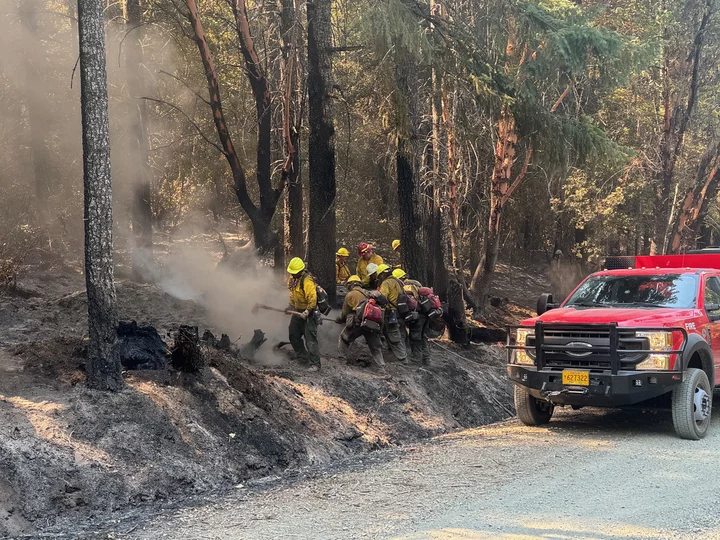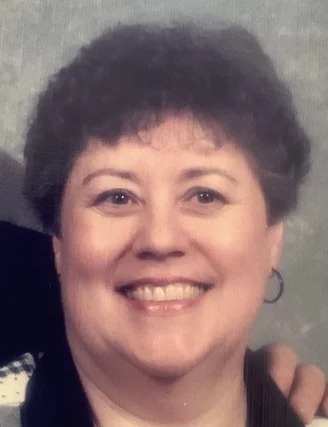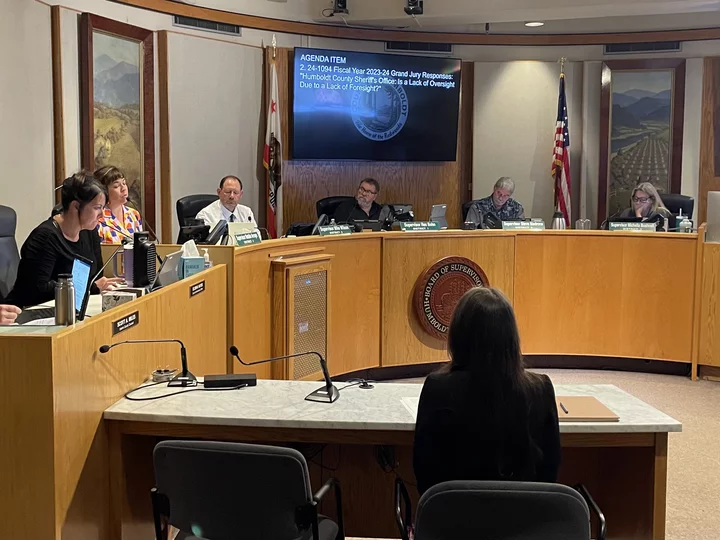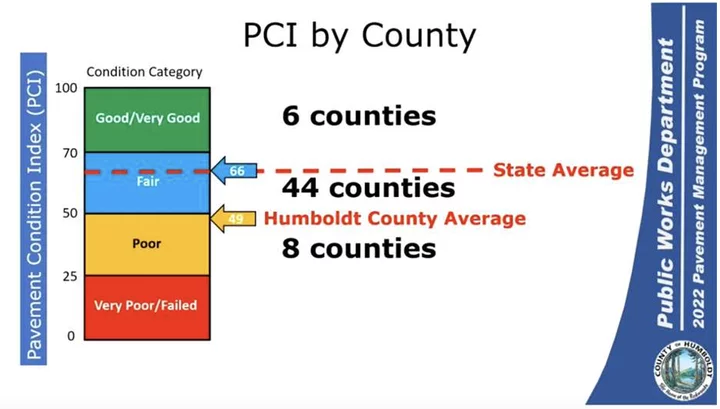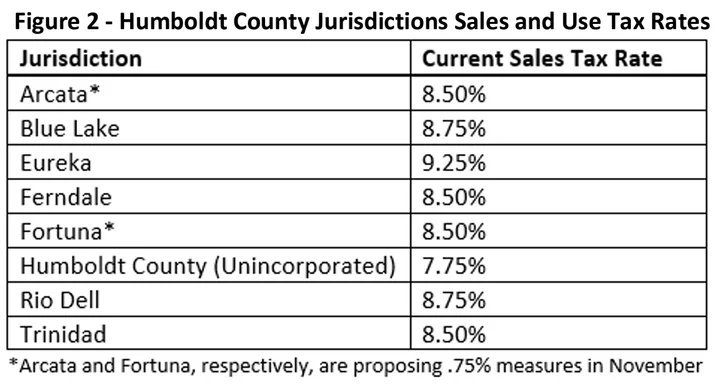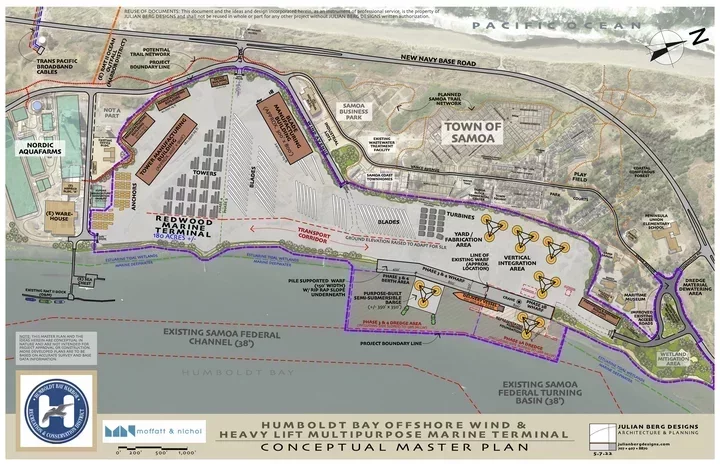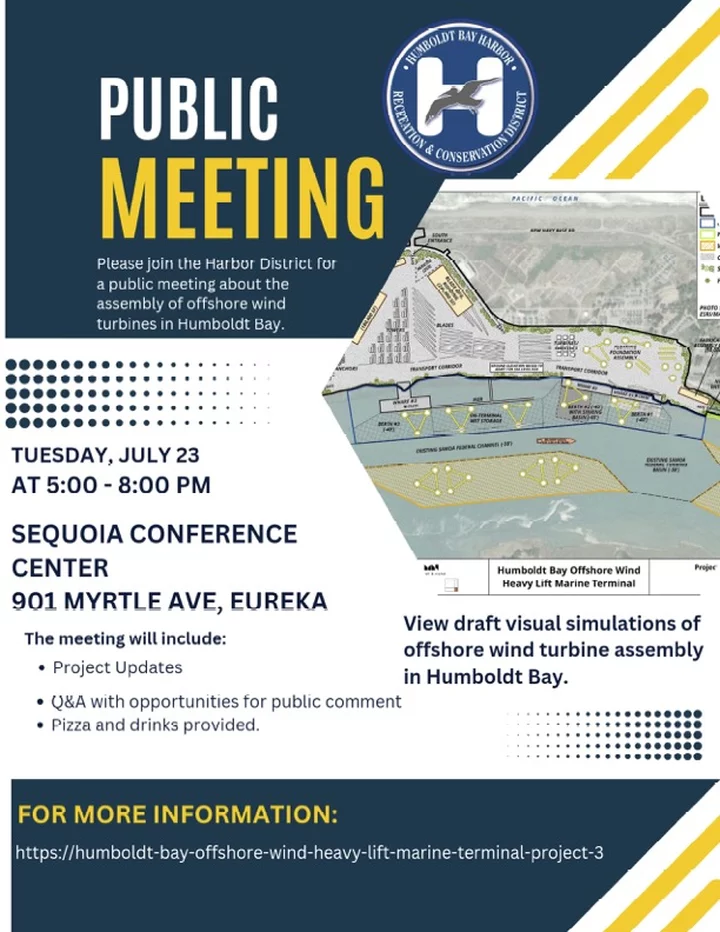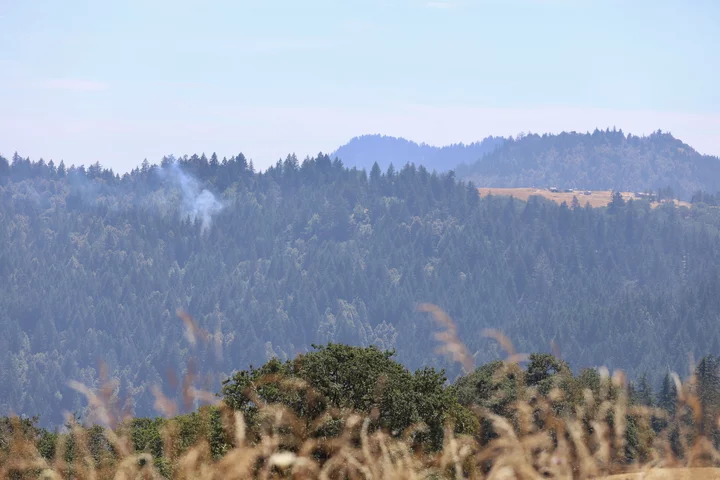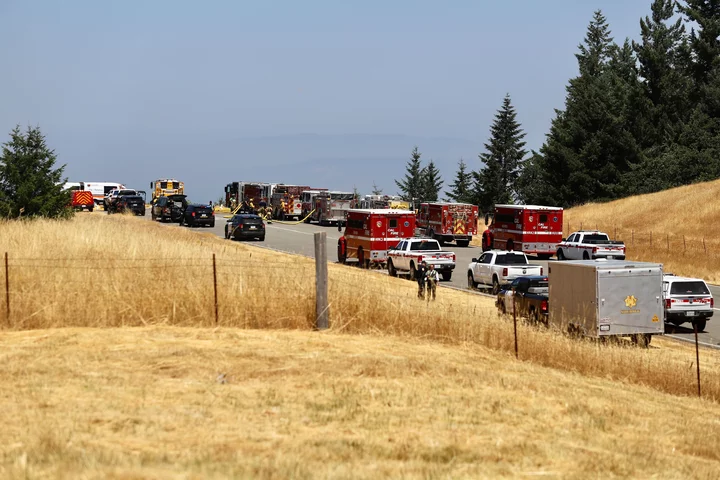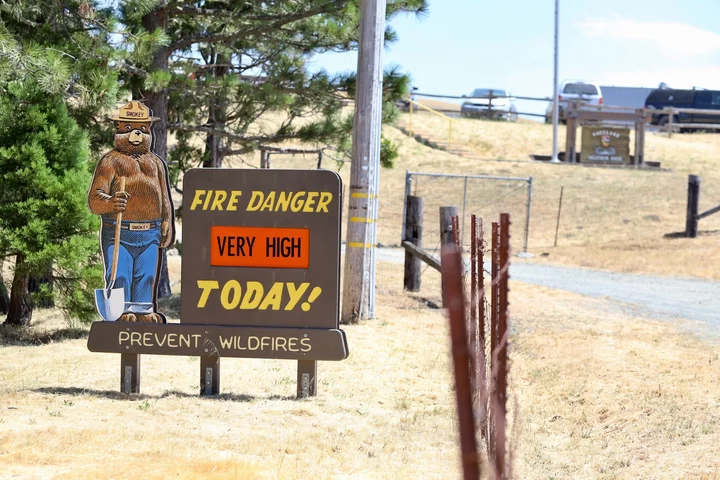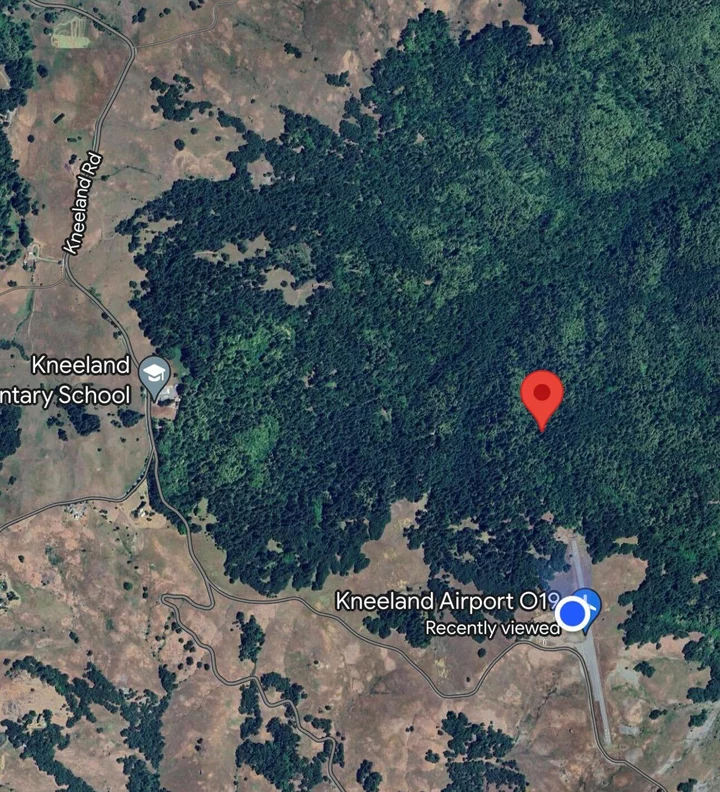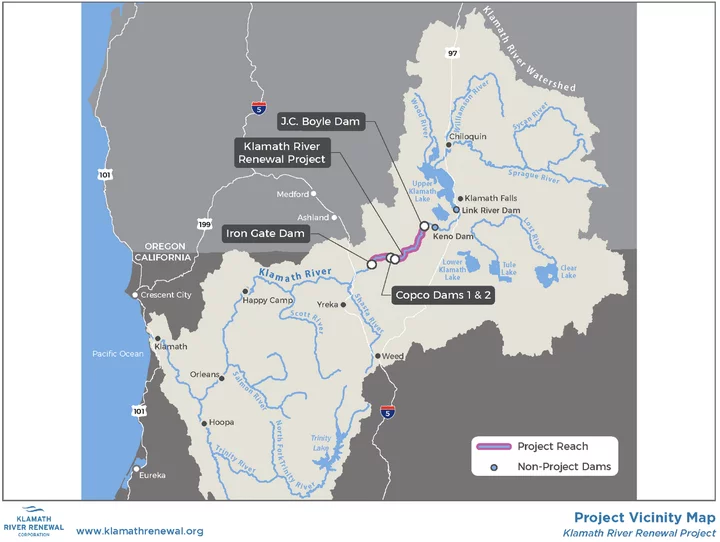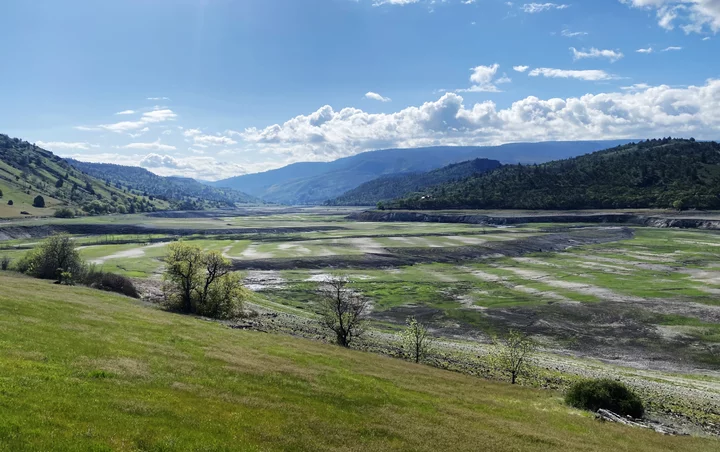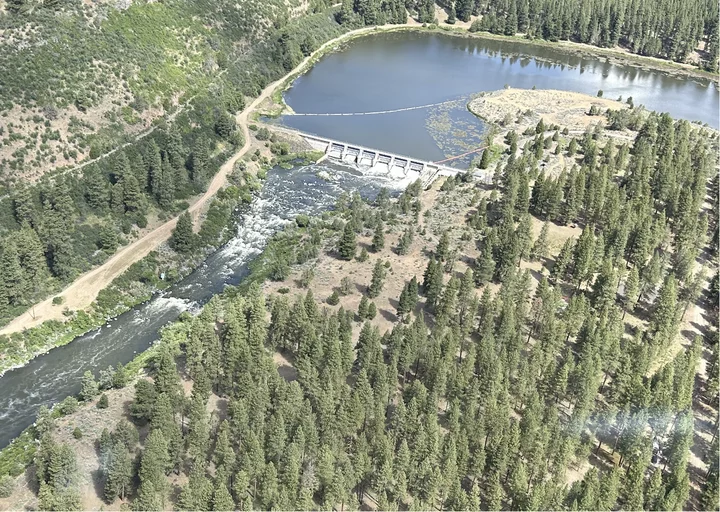Hill Fire Revised to 6,623 Acres, Now 10 Percent Contained; Community Meeting Tonight in Willow Creek
Isabella Vanderheiden / Wednesday, July 24, 2024 @ 10:33 a.m. / Fire
Photos: Hill Fire Incident Command Flickr
###
As of Wednesday morning, the Hill Fire burning near Willow Creek is 10 percent contained and its size has been revised to 6,623 acres, according to an update from Incident Command.
Crews will continue to monitor containment lines along the western and northern edges of the fire. Air resources will focus directly on a spot fire on Sugarloaf Mountain.
“Spotting was observed on Sugarloaf Mountain, prompting firefighters to strategically reposition resources to work on containment,” according to Incident Command. “Crews are working the spot fire from the north and south, with the support of aircraft, and actively engaging the fire directly to achieve containment.”
The Incident Command team will host a community meeting tonight at 7 p.m. at the Willow Creek Bible Church — 39 Brannon Mountain Road in Willow Creek. The meeting will be streamed live on the 2024 Hill Fire Facebook Page.
The following additional information comes from Incident Command:
CURRENT SITUATION:
Yesterday, as local temperatures increased, firefighters worked tirelessly on the Hill Fire. On the southern perimeter, constructed lines held, and additional depth was achieved by focusing on areas of unburned fuel.
Along the western and northern edges, crews diligently monitored previously contained areas and conducted mop-up operations to address hotspots. Crews connected handlines surrounding pockets of heat north of the fire, with ongoing efforts to extinguish these areas in the coming days fully.
Spotting was observed on Sugarloaf Mountain, prompting firefighters to strategically reposition resources to work on containment. Crews are working the spot fire from the north and south, with the support of aircraft, and actively engaging the fire directly to achieve containment.
Today, crews and air resources continue to focus directly on the spot fire located on Sugarloaf Mountain. Meanwhile, on the west side, crews are engaged in mop-up operations and patrolling the area to ensure containment.
There will be a community meeting tonight at the Willow Creek Bible Church at 7:00 PM.
WEATHER:
A passing upper-level shortwave will help ease heat today and slightly increase relative humidity. Expect smoke to lift more than previous days with inconsistent smoke transport out of the area. Winds will battle from southeast in the morning to west in the afternoon, with infrequent and inconsistent gust up to 20 mph. Winds will be heavily terrain influenced. A slight chance of thunderstorms will continue through the early afternoon with any storms most likely to be dry, isolated, and fast moving.
EVACUATIONS: Evacuation order and warnings remain in effect. For current updates on evacuations, visit https://www.facebook.com/HumboldtSheriff and https://humboldtgov.org/2383/Current-Emergencies.
Conditions are subject to change at any time, visit https://protect.genasys.com/search for a full zone description. Sign up for Humboldt Alert emergency notifications at https://humboldtgov.org/2014/Emergency-Notifications
CLOSURES:
Forest Closure Order currently in effect for the area impacted by the Hill Fire. It is temporarily prohibited to be on any national forest system land, trail, or road within the closure area.
To view the closure order and map of closure area visit the following link www.fs.usda.gov/Internet/FSE_DOCUMENTS/fseprd1191963.pdf.
Road closures are currently in place on Friday Ridge Rd. at Forest Service Route 6N06, Friday Ridge Rd. at Forest Route 5N01 and Friday Fridge Rd. at Forest Route 5N04. For updated road closure information, visit protect.genasys.com or humboldtsheriff.org/emergency.
FIRE RESTRICTIONS:
Forest fire restrictions also went into effect on July 12th . Campfires and stove fires are restricted to those developed areas listed in the forest order located at https://www.fs.usda.gov/Internet/FSE_DOCUMENTS/fseprd1188610.pdf.
Smoking, welding, and operating an internal combustion engine also have restrictions in place.
###
BOOKED
Today: 8 felonies, 17 misdemeanors, 0 infractions
JUDGED
Humboldt County Superior Court Calendar: Friday, Feb. 6
CHP REPORTS
Us101 N / Humboldt Hill Rd Ofr (HM office): Roadway Flooding
5859 MM101 N MEN 58.60 (HM office): Trfc Collision-No Inj
ELSEWHERE
RHBB: Crash Blocks Lane on Northbound U.S. 101 at Humboldt Hill Onramp
RHBB: Crash off 101 into Trees North of Willits
Study Finds: When Moths Freeze: How LED Streetlights Are Silencing the Night
High Country News: Trump’s call for deep-sea mining off Alaska raises Indigenous concerns
OBITUARY: Nancy Ann Brunson, 1939-2024
LoCO Staff / Wednesday, July 24, 2024 @ 7:34 a.m. / Obits
Nancy Ann Brunson, age 85, passed away peacefully at home on July 14, 2024. She was born
on May 22, 1939, in Longview. Nancy lived a life filled with love and dedication to her
family, church, and community.
Nancy was raised by her caring parents, Prudence (Brundin) and Rodger Comstock, who instilled in her strong values and work ethic. She graduated from Humboldt State University and pursued a teaching career. Nancy joined Beta Sigma Phi, here she made amazing friends. She married Ronald Brunson in 1958, and together they raised two talented sons. Nancy was a proud member of both the Yurok and Tolowa tribes. She and her cousin, Gene Brundin, loved telling stories about their family heritage.
She had a remarkable career as a Home Economics teacher, where she was known for her professionalism and dedication. Her colleagues and students admired her not just for her skills, but for her genuine care and concern for those she worked with. She inspired many students with her passion for cooking and sewing. Her quilts, bags, and embroidery were works of art. She continued to work at Boyd’s Sewing after she retired from teaching, sharing her talent with others.
Outside of her professional life, Nancy had a variety of interests. Nancy loved to sew, cook, play the piano, and garden. She enjoyed traveling, often visiting Lake County and Washington State to spend time with relatives.
Nancy was a woman of faith, treasuring the many friends she made in The Church of Jesus Christ of Latter Day Saints. She also enjoyed singing in the church choir. Her strong beliefs brought her much comfort throughout her life.
Nancy, and her husband Ron, were instrumental in establishing the skating rink in Blue Lake, a place that brings joy and activity to the community. Nancy was an active member of the Mad River Grange. She spent many evenings playing dominoes with her friends at the grange. She also cherished the time spent camping with Ron and their sons, Randy and Kevin, creating lasting memories in nature.
Nancy is survived by her sister, Jean Martin (Wes); her brother, Charlie Comstock; her sister-in-law, Joanne Comstock; and numerous nieces, nephews, cousins, and dear friends. She was preceded in death by her beloved spouse, Ronald Brunson; her sons, Randal Brunson and Kevin Brunson; and her brother; Peter Comstock.
Her family would like to extend their gratitude to all of the caregivers, especially Todd Martin, and the medical staff who provided her with excellent care.
A memorial service to celebrate Nancy’s life will be held on August 1, 2024, at 3 p.m., at The Church of Jesus Christ of Latter Day Saints, 1660 Heartwood Dr, McKinleyville. All are welcome.
###
The obituary above was submitted on behalf of Nancy Brunson’s loved ones. The Lost Coast Outpost runs obituaries of Humboldt County residents at no charge. See guidelines here.
OBITUARY: Joseph Alfred McCovey, 1998-2024
LoCO Staff / Wednesday, July 24, 2024 @ 7:26 a.m. / Obits
Joseph
Alfred (Hurkie) McCovey was born on August 24,1998, and was
tragically taken from us on July 19, 2024, at the young age of 25.
Hurkie was born in Eureka and grew up along the Trinity and Klamath Rivers. He was a proud Hupa, Karuk and Yurok man, and was a member of the Yurok Tribe. He attended Hoopa Elementary and Hoopa High School and enjoyed playing baseball and basketball. Hurkie loved hunting, fishing, eeling and doing anything outdoors. Most of all, he loved being with his family, and he loved his boys more than anything. His greatest joy was being their dad. If you were looking for him, you’d find him with his parents, Terry and Julie Ann. He was his mom’s love bundle.
Hurkie was the youngest of all his siblings and first cousins and was the baby of our family. He was the definition of a grandma’s boy and shared a special relationship with his Grandma Judy. They had coffee together every morning from the time he learned to crawl up the hill to her house. Hurkie was an old soul, with a beautiful heart, who will be missed forever by those who loved him. Our world is not the same without him.
Hurkie is survived by his parents, Terrance and Julie Ann McCovey, his grandmother, Julia Farnum, his children, Odell, Joseph and Julian McCovey; siblings Ruby (Phillip), Terrance Jr, and Dorothy McCovey, Natalie (Brandon) Scott, Brammel, McKenzie (Monte), Stanley III (Weeya) McCovey, and Florence Peters. His nieces and nephews; LaDayle, Ramona, Gary, Chey, Farron, Tishawnik, Shawn, Chemooch, Deja, Keyla, Eugene, Credence, Cynthia, Teressa, Terrance III, Curtis, Miles, Liam, Tristan, Atuyuriam, Bessie, Keech, Ike, Thaddius, Mark, Peyton, Cooper, Lailie, Lovella, Wyatt, Natalia, Myra, Clara, Ben, Stanley IV, and Barthel. He is also survived by his aunts, Marilyn Powell, Cynthia Henderson, great-aunts Claudette Rogers and Sylvia Carroll, his great-uncle Victor Starritt and his cousins and great nieces and nephews, too many to mention.
Hurkie is preceded in death by his grandparents Julia Starritt Trejo and Stanley “Cart” McCovey, Sr, and Byron Grant, Sr; his siblings Bessie McCovey and Duane Van Pelt III, his uncle’s Dean Powell, Barry McCovey, Sr, Farron McCovey, Sr, Stanley McCovey II and his nephew Phillip Coleman II.
Services will be held Saturday, July 27 at 1 p.m. at the Neighborhood Facilities (NF) Building in Hoopa, CA. Burial will be at the family cemetery in Orleans, CA, with a reception immediately following at the Karuk Tribe’s Department of Natural Resources (DNR) building.
Pallbearers are Chiefy, Brammel and Stanley “Boy” McCovey, Gary Juan III, Shawn and Chemooch Logan, Eric Phines, John Acuna, Tahn and Mawah’che Blake, Kenek Turner, Logan and Delmer Ferris, Farron and Harwood McCovey, Perry Sanderson, Nah-tes and David Jackson, Kistay and Donald Powell, Dellavin McCovey and Barry McCovey, Jr.
Honorary Pallbearers are Charlie, Inker, Gordon, Mikey, Long Gone, Cogy, Kit, Buck, Romeo, Kitsay, Cash, Howie, Touch and Juju McCovey, Ron and Butchie 2nd Place Reed, Robert Starritt, Boyd Ferris, Shawn Turner, Phillip Coleman, Anthony Rogers, Martin Cervantes, Emmanuel Bussell, Alfie Bussell, Hurk and Wade Nixon, Punky Colegrove, Ben Hunsucker, Rick Sanderson, Waymond and Victor Starritt, Willie Willson, Tony King, Sam Jones, Wilson Donahue, Johnny Pratt, Robert Hostler, Alex Lamebear, Sebastian Ferris, Billy Buck Peters, Arden McCovey and Sport Surber. We know Hurkie had a lot of pards, and we are truly sorry if we missed any of you!
###
The obituary above was submitted on behalf of Joseph McCovey’s loved ones. The Lost Coast Outpost runs obituaries of Humboldt County residents at no charge. See guidelines here.
Humboldt County Supervisors Vote to Put a One Percent Sales Tax Measure on November Ballots
Ryan Burns / Tuesday, July 23, 2024 @ 4:43 p.m. / Elections , Local Government
From left: County Administrative Officer Elishia Hayes, Fourth District Supervisor Natalie Arroyo, Third District Supervisor Mike Wilson, First District Supervisor/Board Chair Rex Bohn, Fifth District Supervisor Steve Madrone and Second District Supervisor Michelle Bushnell. | Photo by Ryan Burns.
###
Hoping to generate revenues for much-needed road maintenance and repairs across the county, the Humboldt County Board of Supervisors today unanimously voted to place a one percent (1%) transactions and use tax measure on November’s General Election ballot.
In a presentation to the board, Deputy County Administrative Officer Sean Quincey sought to explain why such a tax measure is needed. He highlighted the increased frequency of natural disasters, including wildfires, flooding, earthquakes and landslides. When the state or federal governments declare emergencies, the county can recoup much of what it spends managing such disasters, but Quincey noted that such declarations aren’t always made, and even when they are it can take years to get reimbursed.
“That situation is taking a toll on the county,” he said.
Quincey also said that over the past 30-odd years, the state government has taken more than $500 million in local property tax revenues that should have gone into the county’s general fund but were instead redirected to state coffers.
The dollar amount nabbed by the state goes up every year, according to Quincey. “And in Fiscal Year 23-24 that amount was more than $25 million that would have otherwise gone to the general fund to take care of local needs,” he said.
With natural disasters becoming an everyday part of life in Humboldt County, Quincey said, “we need to reorient the way that we deliver public services in light of this reality for the county.”
Public Works Director Tom Mattson agreed, noting that the county is currently managing five separate disasters with limited funding and a departmental deficit that ranges from $5 million to $10 million from day to day. While the county government waits to be reimbursed by FEMA or state agencies, more natural disasters inevitably strike.
That has left his department with only enough funding to conduct short-term damage repairs on roadways, rather than the more expensive long-term fixes that are needed, fixes such as retaining walls, improved rock slope protections and, in some cases, reroutes, he said.
“This is a viscous circle, because we’re taking our maintenance money and using it for storm damage, and then we’re waiting six to 10 years to get reimbursement,” Mattson said.
Meanwhile, the pavement on county roadways continues to deteriorate. Up until the mid 2010s, the county’s roads had an average Pavement Conditions Index score in the mid-sixties. (The PCI operates on a scale of 1-100, with 100 being perfect and scores of 70 and above serving as the target for governments to minimize operation and maintenance costs.) The current average score for county roads had dropped to 49, which Mattson said is bad enough to require a full rebuild of many local roads.
Image via County of Humboldt.
###
Implementing a tax to fund roads would also qualify Humboldt as a “self-help” county, making us eligible for more state and federal grants and other sources of revenue, according to staff.
The county retained the public-opinion polling firm FM3 to survey local residents about their priorities and willingness to support a roads-specific tax measure. Miranda Everitt, a senior vice president with the firm, appeared via Zoom today to go over the results. Of the 649 people who responded to the survey, 70 percent said they consider road conditions an “extremely” or “very serious problem.” That figure represents a 13 percent jump from just last year, Everitt said.
The proposed tax measure would be a “general service tax,” which means it would only need to be approved by at least 50 percent of voters plus one vote to pass. FM3’s survey found that 60 percent said they’d vote “yes,” with 36 percent indicating they’d vote “no” and four percent unsure.
Quincey said staff was recommending a one percent tax focused on roads, public transit and 9-1-1 response times, with spending to be overseen by the county’s existing Audit Committee. That committee is staffed by Auditor-Controller Cheryl Dillingham, Treasurer-Tax Collector Amy Christensen, County Administrative Officer Elishia Hayes, members of the Board of Supervisors and several citizen representatives.
The board spent some time discussing the matter. Fourth District Supervisor Natalie Arroyo, who also serves as chair of the Humboldt Transit Authority’s Board of Directors, said she appreciated the inclusion of bus service in the draft language of the ballot measure.
Third District Supervisor Mike Wilson agreed and said that while the county’s last voter-approved tax, implemented a decade ago via Measure Z, has its share of critics, its expenditures are managed via “one of the most transparent processes in the state of California for local funds.” He’d like the county to arrange for something similar in this case.
Fifth District Supervisor Steve Madrone said he thinks the county may have “over-promised” to the public about the potential of Measure Z. “We all thought that it might cover all the public safety issues – and roads are clearly one of those public safety issues – but it really wasn’t enough to do all that,” he said. Madrone added that this roads measure, if passed, would take some of the pressure off of Measure Z.
During the public comment period, a procession of speakers voiced support for directing revenues toward public transit, including bus services. Colin Fiske, speaking on behalf of the nonprofit Coalition for Responsible Transportation Priorities, lauded the Humboldt Transit Authority, calling it “an extremely effective and efficient agency” that provides a vital service to many residents.
Several other residents and nonprofit leaders echoed that sentiment.
One commenter noted that residents in the county’s urban areas will be asked to contribute to this fund even though the revenues would mostly go toward roads that span across the most rural parts of the county.
When the matter came back to the board, Madrone pointed out that every resident in the county uses county roads, just as rural residents generate tax dollars for cities by spending money there. “It’s a community, including all the cities in the county,” he said, “and we’re going to need everybody’s support to really get this over the finish line.”
If the measure passes, it would increase sales tax in the unincorporated parts of the county from 7.75 percent to 8.75 percent. Below is a list of the other local sales tax rates, which would all increase by one percent should this county tax measure pass (and potentially even more in Arcata and Fortuna if voters there approve municipal tax increases in November).
Quincey explained that the tax increase would not apply to groceries sold as food, prescription drugs, medical/dental services, real estate, diapers, feminine hygiene products, education or rent.
Arroyo made a motion to accept staff’s recommendation and send the measure to voters on November ballots. Second District Supervisor Michelle Bushnell seconded the motion, which passed unanimously.
Check the Outpost tomorrow for more coverage of Tuesday’s Board of Supervisors meeting.
What Will Wind Turbine Assembly Look Like From Humboldt Bay? Harbor District Will Show You at Tonight’s Meeting!
Isabella Vanderheiden / Tuesday, July 23, 2024 @ 12:51 p.m. / Infrastructure , Offshore Wind
Conceptual rendering of the Humboldt Bay Offshore Wind Heavy Lift Marine Terminal | Photo: Harbor District
###
The Humboldt Bay Harbor, Recreation and Conservation District will host a special meeting tonight from 5 to 8 p.m. at the Sequoia Conference Center in Eureka to discuss the latest developments surrounding offshore wind projects on the North Coast.
Tonight’s meeting will focus on the Harbor District’s Humboldt Bay Offshore Wind Heavy Lift Marine Terminal project, which aims to convert the Redwood Marine Terminal II I property — formerly home to the Samoa pulp mill Hammond Lumber Mill — into a state-of-the-art industrial site for manufacturing, assembling and exporting the massive components needed for offshore wind development all along the West Coast. The presentation will include a simulation of what the wind turbine assembly process will look like from various perspectives around Humboldt Bay.
Earlier this year, the Harbor District was awarded a $426 million Department of Transportation grant to help fund the ambitious project. The district has until September 2026 to track down more than $400 million in matching private sector funds. Rob Holmlund, the Harbor District’s director of development, previously told the Outpost that he is confident the district can secure the necessary funding.
“Our project is critical to the state and federal governments reaching renewable energy goals, so we’re confident that we’re going to find a way to get the match one way or the other,” Holmlund said.
It’s still unclear who will actually build and operate the heavy-lift marine terminal. In October 2022, the Harbor District entered into an “Exclusive Right to Negotiate” agreement with Crowley Wind Services, a private marine logistics company based in Florida, but that agreement expired a few months ago. The district is expected to issue a new request for qualifications (RFQ) to recruit another company capable of building and operating the marine terminal.
District officials will provide an update on the project at tonight’s meeting and take questions from the public. Check out the flyer below for more information.
###
###
PREVIOUSLY
- Harbor District Announces Massive Offshore Wind Partnership; Project Would Lead to an 86-Acre Redevelopment of Old Pulp Mill Site
- Offshore Wind is Coming to the North Coast. What’s in it For Humboldt?
- ‘Together We Can Shape Offshore Wind for The West Coast’: Local Officials, Huffman and Others Join Harbor District Officials in Celebrating Partnership Agreement With Crowley Wind Services
- Crowley — the Company That Wants to Build a Big Wind Energy Facility on the Peninsula — Will be Opening Offices in Eureka
- Harbor District to Host Public Meeting Kicking Off Environmental Review of Offshore Wind Heavy Lift Marine Terminal Project
- Humboldt Harbor District Officials Talk Port Development As Offshore Wind Efforts Ramp Up
- County of Humboldt, Developers Sign Memorandum of Agreement in a ‘Momentous Step Forward’ for Offshore Wind Development on the North Coast
- Harbor District Responds to Crowley Controversy, Commits to the ‘Highest Ethical Standards’
- LoCO Interview: The Outpost Talks to Crowley Executives About Recent Allegations of Misconduct, Port Development on the Samoa Peninsula and the Company’s Future in Humboldt
- Harbor District Board of Commissioners to Discuss Proposed Offshore Wind Terminal Project, Lease Agreement With Crowley During Tonight’s Meeting
- (UPDATE) Huffman Announces $8.7 Million Federal Grant Toward Offshore Wind Port Development
- Harbor District Commissioners to Discuss Extended Partnership Agreement with Crowley Wind Services During Tonight’s Meeting
- WHOA: Rep. Huffman’s Office Teases $426 Million Federal Grant for Offshore Wind Terminal, to be Announced Tomorrow
- (PHOTOS) The Biggest Federal Grant in Humboldt History? Huffman, Assorted Worthies Gather on Woodley Island to Celebrate $426 Million in Infrastructure Funding for Offshore Wind
- At a Two-Day Conference in Eureka This Week, North Coast Tribes Advocate for ‘Meaningful Engagement’ With Offshore Wind Developers, Federal Regulators
- Crowley Wind Services’s Partner Agreement With the Harbor District Will Expire Without a Lease, Leaving Future Relationship Unclear
(VIDEO) Aircraft Crashes Near Kneeland Airport, Sparking Fire
Andrew Goff / Tuesday, July 23, 2024 @ 11:26 a.m. / Emergencies
UPDATE:
# # #
UPDATE, 3 p.m.: See the video above for updated information from county personnel and CalFire. While no fatalities have been confirmed, the Outpost’s Andrew Goff reports that vehicles from the Humboldt County Coroner’s Office have arrived.
###
UPDATE, 2 p.m.: The plume of smoke emanating from the crash site has all but disappeared, according to the Outpost’s Andrew Goff, on scene. The site of the crash is in thickly forested terrain, making it impossible to see from the roadway.
Emergency responders have deployed helicopters, water trucks and more. We will continue to update as more information comes in.
###
UPDATE, 1:29 p.m.: Emergency personnel from numerous agencies are staged at the north end of the Kneeland Airport’s runway as crews work to get down to the wreckage.
Some units are leaving the scene. The Outpost is in Kneeland and will update if more information becomes available.
A plume of smoke rises from the apparent crash site on the north side of the Kneeland Airport
A fire danger sign outside of the Kneeland Airport.
###
ORIGINAL POST: Scanner traffic indicates that an aircraft crashed near the runway of the Kneeland Airport. Emergency crews have been called to the scene where there is believed to be three patients.
First responders note that the craft is on fire. A neighbor reports to the Outpost that the fire has spread to the hillside near the airport.
A pair of air medevac units are en route.
We will update when we know more.
Klamath Dam Removal Project On Track to Open 420 Miles of Salmon Habitat This Fall
LoCO Staff / Tuesday, July 23, 2024 @ 11:11 a.m. / Infrastructure
National Oceanic and Atmospheric Administration release:
Demolition of Copco No. 1 Dam (Credit: Whitney Hassett/Swiftwater Films)
For the first time since 1918, an astonishing 420 miles of salmon habitat in the Klamath River watershed in California and Oregon will be fully connected by September. This results from the world’s largest dam removal effort, the Klamath River Renewal Project. The amount of habitat opened up on the Klamath is equivalent to the distance between Portland, Maine, and Philadelphia–a journey through seven states.
PacifiCorp, the previous owner, agreed to remove the aging dams after they determined removal would be less expensive than upgrading to current environmental standards. The dams had been used for power generation, not water storage. The Copco No. 2 Dam on the Klamath was removed last year. The deconstruction of the Iron Gate, Copco No. 1, and JC Boyle dams is underway and running ahead of schedule.
“I think in September, we may have some Chinook salmon and steelhead moseying upstream and checking things out for the first time in over 60 years,” says Bob Pagliuco, NOAA marine habitat resource specialist. “Based on what I’ve seen and what I know these fish can do, I think they will start occupying these habitats immediately. There won’t be any great numbers at first, but within several generations—10 to 15 years—new populations will be established.”
There’s more good news for Klamath salmon and steelhead. NOAA’s Office of Habitat Conservation recommends an $18 million award to the Yurok Tribe to restore and reconnect cold-water tributaries that will be open to migratory fish after dam removal. Another roughly $1.9 million award is recommended to the Oregon Department of Fish and Wildlife to begin evaluating options for improving fish passage at Keno Dam. The Keno Dam sits upstream of the dams currently being removed. Nearly 350 miles of additional salmon habitat lie upstream. Both awards are funded through the Bipartisan Infrastructure Law and Inflation Reduction Act.
“The Yurok people are extremely happy to be witnessing the beginning of the Klamath River’s rebirth,” says Yurok Tribe Fisheries Department Director Barry McCovey. “The dams caused a tremendous amount of damage to the Klamath over the last century. Through the decommissioning project and holistic restoration, we are confident that we will see the Klamath’s salmon, steelhead, and Pacific lamprey runs recover.”
A River Reborn
The Klamath River once produced the third-largest run of salmon in the lower 48 states. It was the lifeblood of tribes throughout the region and supported important commercial and recreational fisheries. However, major dam construction between 1918 and 1966 and other development cut off the upstream pathway for migrating salmon. Tribes and other community members who depended on salmon fisheries lost this critical cultural and subsistence resource.
In 2002, an estimated 30,000–70,000 fish perished in the Klamath River below the dams, partially due to low flows being released from the Iron Gate Dam. Following this event, the Yurok Tribe launched an investigation and, together with other tribes, called for removal of the dams. Since then, NOAA and other federal, state, and local agencies as well as nonprofits and other groups have joined the effort. The Klamath River Renewal Corporation took over ownership of four dams from PacifiCorp, and is overseeing the removal process.
Map of the Klamath River watershed showing the four dams being removed as part of the Klamath Renewal Project as well the upstream Keno and Link River dams | Klamath River Renewal Corporation
In April, NOAA scientists, restoration specialists, and the head of NOAA Fisheries, Janet Coit, gathered on a slope above the Klamath River to watch it being reborn. Over the winter, crews had breached three of the remaining major dams blocking the river’s natural flow, draining the reservoirs behind them. The river found its historical channel for the first time in more than a century, a crucial step in preparing the habitat for the return of salmon.
“Many of our colleagues have spent more than 20 years working towards this moment,” says NOAA Fish Biologist Shari Witmore. “Watching the recovery and how quickly it’s happening has been impressive and emotional for us all.”
In the long term, dam removal will significantly improve water quality in the Klamath. “Algae problems in the reservoirs behind the dams were so bad that the water was dangerous for contact during the summertime, meaning it was not safe for you and your dog to swim in and not drinkable,” says Fluvial Geomorphologist Brian Cluer. “Taking these large reservoirs out gives the river water a chance to aerate, increasing oxygen levels and reducing algae production.” It will also reduce water temperatures and the risk of salmon-killing disease outbreaks.
Plants sprouting from the reservoir footprint on the Klamath (Credit: Tommy Williams/NOAA)
Helping Salmon Adapt to Climate Change
Reconnecting the river will help salmon and steelhead populations survive a warming climate and disasters like forest fires and droughts. Migrating adults will be able to reach spawning grounds in tributaries with cold-water springs, increasing the survival rate of juveniles. With access to more habitat, fish can distribute across the landscape within the Klamath Basin. “If a forest fire impacts a specific river reach or tributary, individuals or populations elsewhere in the Basin can still support fish from that same cohort, year class, or life stage,” says NOAA Research Fisheries Biologist Tommy Williams. “Fish from other tributaries or mainstem areas are available to sustain the Basin’s populations as a whole.”
The window for migration will also widen. “There are probably going to be fish moving back and forth 365 days a year,” says Williams. “This expanded migration period helps the population because the freshwater and marine environment are dynamic and variable. If conditions are less than favorable at a specific time or location, fish migrating throughout an expanded migration window are more likely to find favorable conditions.”
Providing access to what historically was a more complex, dynamic ecosystem strengthens their ability to adapt to challenges. “When you simplify the habitat as we did with the dams, salmon can’t express the full range of their life-history diversity,” says Williams. “The Klamath watershed is very prone to disturbance. The environment throughout the historical range of Pacific salmon and steelhead is very dynamic. We have fires, floods, earthquakes, you name it. These fish not only deal with it well, it’s required for their survival by allowing the expression of the full range of their diversity. It challenges them. Through this, they develop this capacity to deal with environmental changes.”
Painting of salmon migrating up the Klamath by Mt. Adams Institute Veteran Intern Evan Daley. The Mt. Adams Institute Veteran Intern program is funded by NOAA.
The Return of Salmon
NOAA scientists expect small numbers of salmon will begin swimming upstream following the removal of dams this fall. But, it will take years before sizable populations return. Salmon and steelhead have 3- to 5-year life cycles, so fish born in the river won’t return for several years.
“For most of these species, it’s going to take four or five generations—12 to 25 years—before we see established populations upriver,” says Williams. “And that’s contingent on many other things like ocean conditions, droughts, and fires. A lesson from the Elwha River dam removals was that the response time varies among species and perhaps for populations in specific locations within a large river basin. In the Klamath Basin we will very likely also observe differences among species and perhaps among populations within species in the time it takes to establish populations.”
However, repopulation may occur more quickly than the 12–25 years it could take for these species to reestablish in the Klamath basin. “We’re 10 years past the removal of major dams on Elwha River in Washington, which was blocked for more than 100 years,” says Williams. “It’s now seeing large numbers of fall Chinook salmon. That’s two and a half generations. This gives us confidence in what these fish can do.”
Models predict that as many as 80 percent more Chinook salmon could return to the Klamath basin within 30 years–six to 10 fish generations. Ocean harvest could increase by as much as 46 percent.
The California and Oregon departments of fish and wildlife expect most fish populations will naturally repopulate the watershed. Stray salmon will lead the way. Salmon and steelhead typically return to the streams where they were born to reproduce. However, a growing body of evidence shows that both adult and juvenile fish occasionally stray from their natal habitat to explore new areas. This type of dispersal is well suited for the dynamic environment where salmon are found.
Salmon migrating upstream (Credit: Mid-Klamath Watershed Council)
The straying of some fish helps a population’s genetic legacy outlast disturbances in the stream where they were born. “If you have a few individuals in a population who don’t return home and something happens—Mt. St. Helens erupts and fills the Toutle River with large flows of sediment, killing the fish there—the strays live on,” says Williams. “It’s more or less genetically and demographically beneficial for fish to have this capacity, so if the population gets knocked down, its legacy has a chance to return. In addition, dispersal of fish from other watersheds will find their way into streams and rivers like what happened in the Toutle River.”
Williams expects that after the dam removals, a few fish will disperse upstream and find historical spawning areas. Some of their offspring will return to those streams, and others will find different streams nearby. Slowly, populations will expand across the landscape.
NOAA’s state and tribal partners will conduct extensive monitoring to understand how fish use and repopulate the newly opened habitat. Partners are planning to monitor the effectiveness of the dam removal project using a sonar camera and in-river sampling. This will determine the number and species of fish that are passing by the former Iron Gate Dam site. The project team will also radio tag a subset of these fish and track their journey as they reoccupy new habitat. NOAA will use this information to evaluate the effectiveness of restoration investments, and manage commercial, sport, and tribal fisheries.
Keno Dam on the Klamath River in Oregon located at river mile 236.4. (Credit: Mark Hereford/ODFW)
What’s Next: Reservoir Reach and Fish Passage at Keno Dam
Once the dams come down, NOAA and its partners will begin restoring the Reservoir Reach. That’s the mainstem river and tributaries between the site of the Iron Gate Dam and Link River Dam. “Dam removal is a huge first step, but we’re not done yet,” says Pagliuco. “We need to continue to restore this area to give salmon the best chance to recover.”
In 2022, NOAA, Trout Unlimited, and the Pacific State’s Marine Fisheries Commission released a Reservoir Reach restoration plan that detailed 200 projects to improve salmon habitat. NOAA recently recommended $20 million in funding to address major priorities identified in the plan.
The Yurok Tribe will design and implement habitat restoration in several priority tributaries in the Upper Klamath Basin with an $18 million award. They will:
- Restore up to 140 acres of floodplain habitat
- Reopen 16 miles of stream habitat
- Construct 20 acres of instream habitat features such as logjams and spawning gravels
The Yurok Tribe and NOAA, in collaboration with other tribes and nonprofits, will identify high-priority sites through the planning and design process.
The Oregon Department of Fish and Wildlife is exploring fish passage options at Keno Dam with a recently recommended $1.9 million NOAA award. The Keno Dam sits between the soon-to-be removed JC Boyle Dam and Link River Dam, the most upstream dam on the river.
“The fish ladder on the Keno Dam was not designed to pass anadromous fish,” says Williams. “It was built after two downstream dams were in place when salmon were already blocked from migrating upstream.” When the three downstream dams come down this fall, migratory fish will finally be able to reach the Keno Dam. But, they might have difficulty finding the fish ladder or passing this structure that anadromous salmon and steelhead have never tested.”
Alternatives for fish passage range from building a salmon-friendly fish ladder to completing dam removal. Designs would need to both provide fish passage and retain irrigation and other functions for the surrounding community. Over the next 3 years, the Oregon Department of Fish and Wildlife and its partners will:
- Identify fish passage options in coordination with partners, tribes, and community members
- Study the feasibility of the most viable fish passage options
- Develop cost estimates
- Create a 30-percent engineering design for the chosen option
The Klamath Tribe’s ancestors subsisted on salmon for millennia before the dams were built. Tribe members will play a key role in developing and evaluating fish passage options.
Additional partners include:
- Shasta Indian Nation
- Modoc Nation
- Karuk Tribe
- Ridges to Riffles Indigenous Conservation Group
- Trout Unlimited
- Klamath Water Users Association
Together, this $20 million investment will be truly transformational. It will begin to reverse decades of habitat degradation, allow threatened salmon species to be resilient in the face of climate change, and restore tribal connections to their traditional food source.

